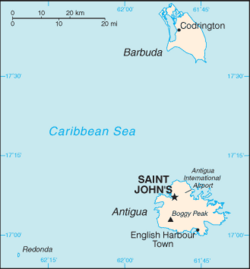St. John's, Antigua & Barbuda
| St. John's | |
|---|---|

St. John's in mid-December 2011
|
|
 Location of St. John's in Antigua and Barbuda |
|
| Coordinates: 17°07′N 61°51′W / 17.117°N 61.850°W | |
| Country |
|
| Island | Antigua |
| Colonised | 1632 |
| Area | |
| • Total | 10 km2 (4 sq mi) |
| Elevation | 0 m (0 ft) |
| Population (2011) | |
| • Total | 81,799 |
| • Density | 3,100/km2 (8,000/sq mi) |
| Time zone | AST (UTC-4) |
Coordinates: 17°07′N 61°51′W / 17.117°N 61.850°W
St. John's is the capital and largest city of Antigua and Barbuda, a country located in the West Indies in the Caribbean Sea. With a population of 22,193, St. John's is the commercial centre of the nation and the chief port of the island of Antigua.
The settlement of St. John's has been the administrative centre of Antigua and Barbuda since the islands were first colonised in 1632, and it became the seat of government when the nation achieved independence in 1981. Saint John is also the capital of Antigua.
St. John's is one of the most developed and cosmopolitan municipalities in the Lesser Antilles. The city is famous for its various shopping malls as well as boutiques throughout the city, selling designer jewellery and haute-couture clothing. There are also many independent, locally run establishments, selling a variety of fashions.
St. John's attracts tourists from the many exclusive resorts on the island and from the cruise ships which dock in its harbour at Heritage Quay and Redcliffe Quay several times a week.
The investment banking industry has a strong presence in the city. Many major world financial institutions have offices in St. John's.
There is a market on the southwestern edge of the city where fresh produce, meats, and fresh fish are sold daily.
The Antigua Rum Distillery is located at the Citadel and is the only rum distillery on the island. Annual production yields more than 180,000 gallons bottled.
The majority of the population of St. John's reflects that of the rest of Antigua: people of African and mixed European-African ancestry, with a European minority, including British and Portuguese. There is also a population of Levantine Christian Arabs.
...
Wikipedia
